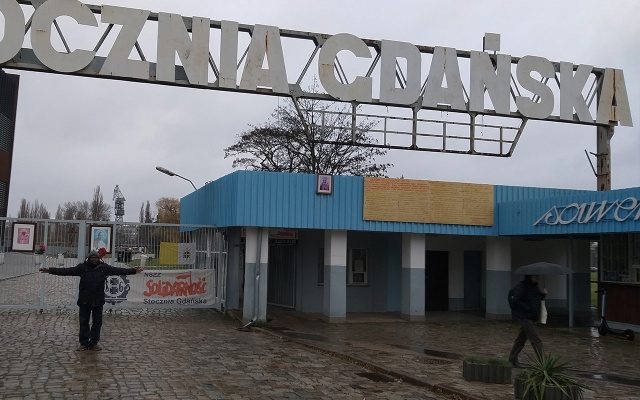Krzysztof Gutfrański: You are a Senegalese, who has lived in Poland for 36 years. You are as familiar with Polish history and culture as many Polish citizens who were born here. In your opinion, how do Poles perceive “the Other”? Do you think that our society needs dis-othering?
Mamadou Diouf: Since the Polish–Lithuanian state used to stretch almost from one sea to another, its vastness meant a lot – for one thing, in a linguistic sense. It was and had to be multiethnic and multinational. Of all people, Poles – who are familiar with their own history – do not need the process of dis-othering. To be Polish in fact means to be aware what it means to be different. Since the time of Casimir the Great, who had cities built and invited Jews and Armenians to live in them, so much water has flowed under the bridge that the Polish DNA must contain this “otherness.” We think back to World War II, which brought a homogenization of Polish society. We can also take into account the socialist era, but it seems to me that the many centuries of being a multiethnic society count for more than half a century of communist isolation. The memory of otherness cannot disappear so quickly. In the 1980s, people in Warsaw did in fact stare at Africans. But so much has changed since then. Now, in the capital there are big international companies, lots of students and workers from all over the place, almost all the world’s cuisines etc. It is much easier to be in touch with otherness than it used to be. Nowadays, I don’t notice any weird behavior on the street in Warsaw.
What made you stay in Poland?
Music and the people that I was playing with. For a vet, this sounds like a strange thing to be saying. But this is exactly how it was in 1995. I graduated and got a PhD, but I also had my first CD under my belt, called African Snow with Kinior’s Orchestra and, importantly, I began to work closely with Voo Voo. It was because of these two institutions that I stayed in Poland.
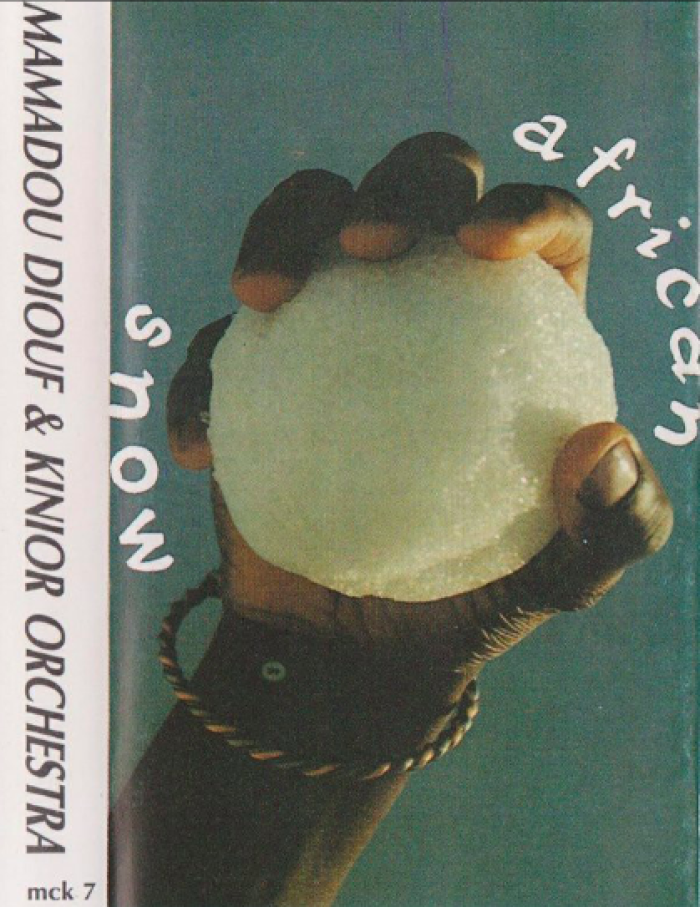
Okładka albumu "African snow" z muzyką Mamadou Dioufa i Kinior Orchestra (1993). Kamahuk/On-U Sound. Źródło.
Do you get the feeling that Polish people, overworked as they are, find music and dance a fun way of spending time?
When it comes to dancing, things are weird in Poland. I was a DJ in quite a few clubs in Warsaw, so I know what I’m talking about. There is a kind of embarrassment when it comes to dancing, especially with guys. Of course, I mean dancing when sober.
This is probably because Poles have turned their backs on their own folk music. We admire the Brazilian samba, Cuban salsa and say that Africans have a natural sense of rhythm. No African can dance a kujawiak or oberek better than… Well, I was going to say, “Better than a Pole.” But Poles are embarrassed by such music. I can’t understand it. When you are not in tune with your own native dances, it is harder to learn those of other people. Maybe that is why guys when they are short of alcohol are quite stuffy when it comes to dancing. Everywhere in the world, traditional music is the best way to learn dancing, because the steps are quite complex. When you learn them, just as well as you do your own language, everything else comes easily. But television, even state television, and private radio, don’t play this music. This omission is very strange. The Spanish are not ashamed of flamenco, the Portuguese love fado. But what traditional rhythms do Poles love? In this country there is a lack of positive promotion of the traditional folk music and country music, there is no open-air summer festival on the scale of the Opole or Sopot festivals, with bands from the old cultural regions. Such a festival could present not only the music but also the costumes that nobody wears any more in the street in Poland. And this is an important part of the national identity!
We have disco polo, the native folk-based pop music. What would you imagine a similarly powerful “Polish reggae” to be like?
This is a continuation of the previous comment. We do not “have” disco polo – this is just imported dance music. It is not enough to stick the adjective “polo” on something to make it Polish. Unfortunately, such dance music has derailed Polish folk music. Disco has never had any greater ambition than entertainment. I am not commenting on the textual and music layers of disco polo. Polish reggae as practised by the group Trebunie Tutki from Podhale and the Jamaicans from the group Twinkle Brothers provide a fantastic meeting of cultures and a very high standard. Reggae took off just at the time when I came to Poland in the mid-1980s. I think that if the Polish language were more popular in the world, Polish reggae would have a greater chance of success, because it merits it.
You have created many projects promoting Africa. Which of these are the most important to you?
It was definitely the book “Afryka w Warszawie – dzieje afrykańskiej diaspory nad Wisłą” [Africa in Warsaw – The History of the African Diaspora in Poland,” which I edited with my friend from Białystok, Paweł Średziński, in 2010. We discovered some amazing things. I found a black Polish general Jabłonowski, of African descent, from the time of Napoleon. We also discovered a Nigerian who took part in the Warsaw Uprising. The second book is entitled “Czy Afryka jest krajem?” [Is Africa a Country?] and it is aimed at journalists, who keep writing about a war “in Africa” –despite the fact that a given war is usually taking place in one of the 54 countries on the continent.
Our foundation has also published a nice record with Warsaw folk music with the participation of Polish, African, and Lithuanian musicians. In May, we also have the annual Africa Day open-air concert, which enriches Warsaw’s cultural offerings.
In recent years, philosophers, economists, and politicians have been telling us repeatedly that Africa is where the future of the world as we know it will be determined. In this context, how do you see the situation of Poland, a semi-peripheral country in the heart of Europe? What is our relationship with Africa?
The sequences of events that determine human history are so extended that we don’t notice them. The global industrial and intellectual hub has shifted over time: Egypt, Mesopotamia, Greece, Rome (that controlled North Africa), not forgetting the Incas in South America, India, where Hindu-Arabic numerals originated, etc. These are all well-known facts, so I am surprised at those who think that nothing can now change any more. That is an arrogant way of thinking. Africa’s time must come. This is the youngest continent, which is very rich, but simply badly mismanaged. Poland is not peripheral. I am convinced of that. There is still much to be done economically, but it seems to me that you cannot see as peripheral a country that has historically championed religious tolerance, was home to the first ministry of education and one of the world’s oldest universities, the world’s second state constitution, the Warsaw Confederation and the Solidarity movement.The motherland of Paweł Włodkowic, Copernicus, Maria Skłodowska, and Karol Wojtyła – to mention just a few! One should appreciate culture as a whole, over the centuries. Let us assume that, following the communist era, the time of healing has come, which could perhaps be happening faster were it not for politicians’ squabbles. Poland has its new Polonia, a cultural and academic diaspora of graduates of Polish universities, who have returned to their native countries in Africa. Willy-nilly, they are the ambassadors of Polish science! How many of them have passed through Polish universities and polytechnics over the last three or four decades? I am convinced that if Poland would only look after that group, organizing various conferences or get-togethers in East, West, or Central Africa, this could prove fruitful for in relations with those countries.
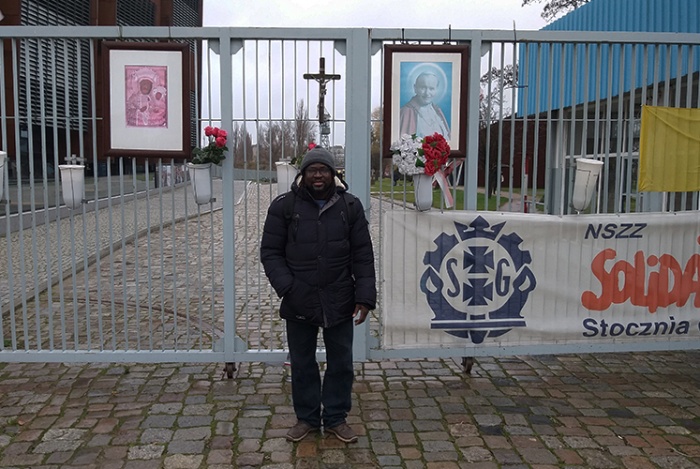
Mamadou Diouf przed Stocznią Gdańską. Zdjęcie: Paweł Średziński. Dzięki uprzejmości autora.
Your activities, which are very successful, include music, working for culture and NGOs, journalism. How would you describe your profession?
I am an animator, who very much appreciates multiculturalism. Contrary to the latest stereotypes, every one of us is “multi-culti” – the term has outlived its usefulness. Who is a Pole, whose cultural identity is firmly rooted in a faith that originated in the Middle East, in the Semitic cultural sphere? Is he or she not a perfect example of “multi-culti”?
How has your perspective changed – from being perceived as a stranger and outsider, to feeling Polish?
A good question. You used the right word: “feeling.” To identify with a newly chosen place, one does not need the permission of the local people. This is what I think. Nobody knows how feelings are born. We don’t have to justify falling in love and loving relationships; we only need to provide reasons for divorce and a parting of ways. My perception changed when I was touring Poland with the band in the late 1990s. I realized that I didn’t really know the country. I began to spend more time learning the language, learning philosophy in Polish and, above all, getting to know Polish history. And it is very rich. All this accelerated the feeling that you referred to in the question. At about the same time, I became a fan of Polish athletes, such as Małysz, the Olisadebe generation, and later Justyna Kowalczyk, Agnieszka Radwańska, and many others. I am in tune with this place and I respect it, that’s all there is to it.
Catholicism, ethnic origin and speaking native Polish continue to be the main indicators of Polishness. What are the consequences of saying: “I am Polish, because I want to be?”
There is only one: I got to know Poland, its customs and history. It is a pity, all the same, that – as I have noticed – for the younger generation history starts with World War II. For me, the statement “I am Polish” is something that I associate with knowledge about this country. The language and blood are something that we are given. For this reason, what counts is work and getting to know your history – in other words, making an effort.
Wincenty Lutosławski, a philosopher, nationalist, and a friend of Dmowski’s, in 1939 expressed himself in plain words: “Germans, Tatars, Armenians, Gypsies, Jews – as long as they live for the common ideal of Poland, they belong to the Polish nation. […] A Negro or an Indian can become a real Pole, if he adopts the spiritual inheritance of the Polish nation […] and if he has the resolute determination to contribute to the development of the Polish nation.” Disregarding the dated racial references, how does this relate to the present situation on Polish streets?
Contrary to what we may think, the philosopher spoke in the spirit of openness. Everybody can become a Pole and become one of the indigenes, as long as he respects the local traditions. Let us remember that in the 1930s the concept of tolerance was forgotten about. But this is a concept that is close to the Polish spirit – because it is a Christian value, but also, for one, because tolerance became an important Polish argument against the Teutonic Knights in the Council of Constance. I don’t believe that what Lutosławski had in mind was that the outsider should just dissolve, like sugar in a cup of tea. Nobody likes to assimilate, neither Poles in Lithuania or Argentina, nor Armenians or Jews in Poland. The fact is that in a time of freedom it is not possible to format people. What is very important is the motif of development. To my mind, what he meant was that a Pole is someone who does not cheat ZUS [social insurance institution], pays his taxes, and creates places of work. For me, these are all important aspects of patriotism. As for the Polish street, I have the impression that 2015 was the watershed.
For me, the question of accepting or not accepting refugees was peculiar. A country that aspires to have an important status in the EU should be able to take on a bit more responsibility and invite at least a symbolic hundred people. But this did not happen. The streets did not erupt; it was the politicians and certain media that came up with comparisons that were unworthy of people who believe that we are all descended from Adam and Eve.
In Polish there are a number of racist sayings that employ derogatory terms for black people. Even Radosław Sikorski, who was the Minister of Foreign Affairs at the time, talked about Polish subservience to the USA using such metaphors. Do you see a Polish inferiority complex in employing this kind of language?
The Polish attitude to Africa left its shadow on two important figures of Polish culture: the Nobel winner Sienkiewicz who, in one of his children’s books made fun of the imperfect use of language by the African boy Kale, and Tuwim, who in one of his poems also made jokes about the little black boy Bambo. This is how the Polish psyche acquired its “bambomental” slant, or looking down on Africa, patronizingly yet not without a sense of disquiet. This attitude can also be found in business relations and elsewhere. If not for the “bambomental,” the Polish President would not be making jokes about cannibalism in Africa. The liberties that many politicians take towards sub-Saharan Africa shows a total lack of good manners.
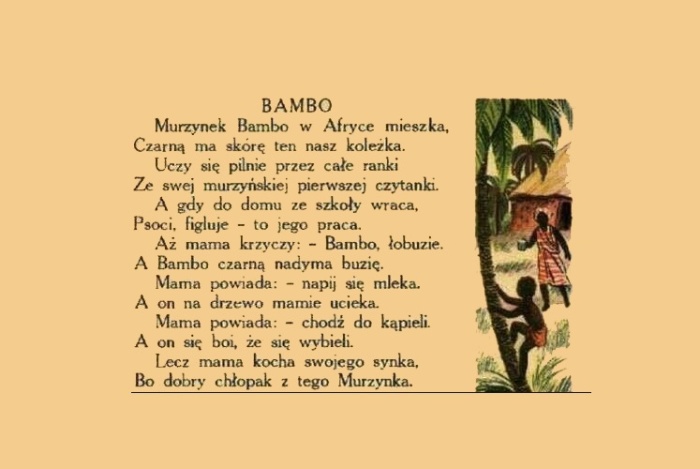
Julian Tuwim, "Murzynek Bambo" z elementarza Mariana Falkowskiego (1958).
What are the most surprising experiences that you have had in relation to otherness during the Polish transformation?
Actually, this is something that happened before the time of transformation. In 1987 or 1988 all we foreign students had to take a compulsory AIDS test. There was no similar requirement for Polish students. That was a bolt out of the blue. I experienced something similar when in 2015 I heard that viruses and bacteria were crossing the Mediterranean in the bodies of refugees.
Thinking of references to Poles of the better and “worse” sort, or Poland A and Poland B, how do you perceive Polish class divisions? What do you think of the present antagonisms and the political situation in Poland?
We should all care about the impression that Poland makes in the EU and in the world. Anybody who says that they don’t care is lying. I remember Poland under communism, where you could only buy desirable goods in the Pewex shops for dollars, queuing from 6 a.m. to buy things, food vouchers… I have even kept one from 1988 as a souvenir! That was a sad Poland. In the last three decades, the country has progressed in leaps and bounds. I am amazed that the old post-Solidarity (AWS) quarrels still carry on. We cannot exchange our powerful neighbors Russia and Germany for any others, so, being more diplomatic might be useful. It is a similar story with the conflicts over the courts and the law. Do these conflicts benefit us in the economic sense? The political scene should address such questions. There is no politics without a difference of opinion. Each body has its vital organs; in the same way each state has some vital issues around which a consensus is created.
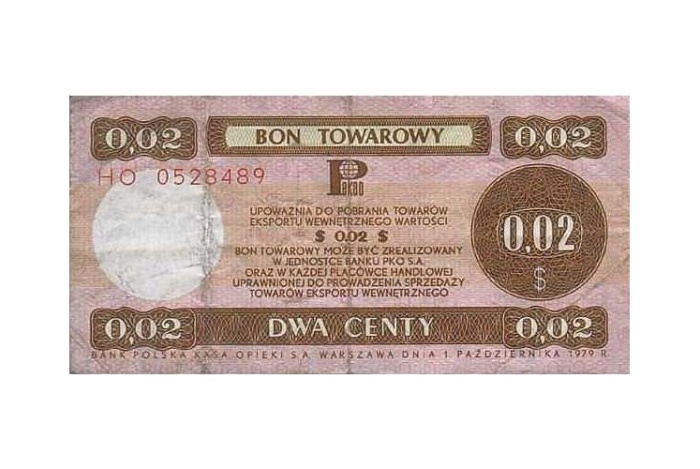
Bon towarowy o wartości 2 centów. Źródło: wikimedia commons.
How are such matters resolved in Senegal?
Well, right now in Senegal a heated discussion is going on. Four years ago, gas and oil were discovered. The question is how to make industrial use of these assets in a way that would not lead to conflicts, as has happened in other countries that have similar resources? The political situation in Senegal is specific, because the parties only take notice of the two Muslim brotherhood organizations. They interfere with politics much more forcefully and profoundly than the Catholic Church in Poland does. From the beginning of the 21st century, almost all the important parties are a part of either one or the other coalition: the government or the opposition. The current president won the election in February and has the prospect of a four-year second term in office, but a few weeks ago a rumor spread of a potential third term. Nobody knows where this rumor came from. People are protesting, because the constitution allows a maximum of two terms in office. Unfortunately, in Senegal politics has become a job. Many politicians do not have a profession to which they could return if they were unsuccessful in elections. This is probably why changing the party color has become the norm.
This issue of Obieg raises the topic of Africa in Poland. How do you understand the issue of the diaspora in Warsaw, and how do you view it from the perspective of Senegal?
There are Africans in Poland, but we are not a diaspora as yet, because we do not have an African organization on a national or Warsaw scale. There are some active organizations such as the foundation Afryka Inaczej or the Foundation for Somalia. We don’t even have a restaurant in Warsaw with our national cuisine. The Nigerian restaurant La Mama no longer exists, neither does the Senegalese Baobab. For three years, the only event devoted to the continent – Africa Day, which takes place in May – has not received any subsidies from the Warsaw Council. We have no idea why. The African embassies are not interested in changing the perceptions of the continent, so it’s a vicious circle.
The message of which of important Senegalese figures do you consider worth propagating in Poland? Would it be Leopold Sedar Senghor, Cheikh Anta Diop, or perhaps Amadou Bamba? What is the role of women?
I am, so to speak, “made by Senghor.” I went to school when he was President and I have great respect for his thought. Cheikh Anta Diop made me realize that the Greeks learnt from the Egyptians. I am convinced that ancient Greece drew to a large extent on Egypt. Why was European philosophy not born in the British Isles or in Scandinavia? Because neither one group nor the other had neighbors from whom they could learn. Amadou Bamba is a figure that I admire. I am an animist – in Senegal we say “chedo”; this means that I identify with Serer, the faith of my ethnic group. It comprises God, the spirits of our ancestors, and people, to put it simply. In turn, Bamba, as a spiritual leader in the colonial era, combined Gandhi’s pacifist approach with Mandela’s determination and a Protestant work ethic. In the Senegalese consciousness, women from the village of Nder are a symbol of the fight against enslavement by the Moors. On that fateful Tuesday 7 March 1820, the Moors arrived in the village when the men were in the fields – the women chose group immolation. There are many in Senegal who would like to celebrate Women’s Day on the 7th and not the 8th of March for this reason. Another female figure is Alin Sitoe Diatta, who comes from the south of Senegal (Kasamans). She is an African Joan of Arc. The French deported her to Timbuktu for insubordination. She died in 1944, at the age of 24.
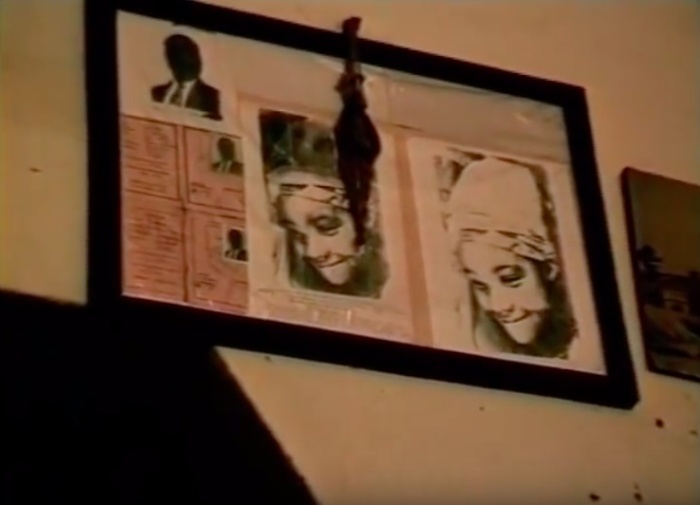
Aline Sitoe Diatta. Klatka z filmu dokumentalnego. Źródło: https://www.youtube.com/watch?v=XCyOOEiLDnM.
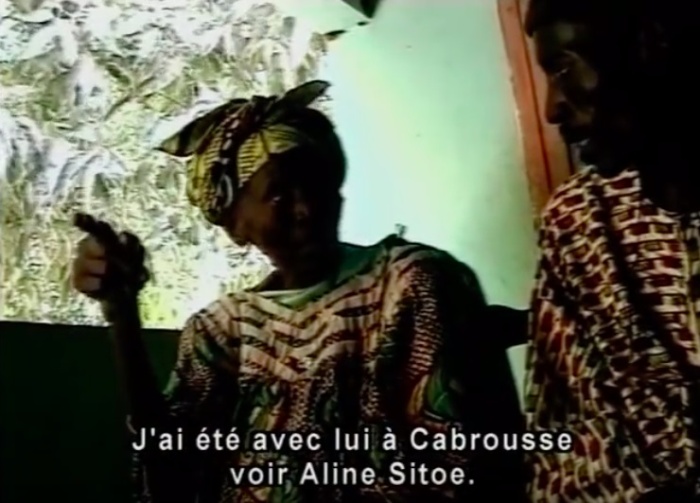
Aline Sitoe Diatta. Klatka z filmu dokumentalnego. Źródło: https://www.youtube.com/watch?v=XCyOOEiLDnM.
What does it mean to feel African? In your opinion, is there a basis for the concept of “Africanness?” Or would it be better to refer to specific characteristics of smaller group identities?
Identity makes sense. People always base opinion on what they see and think that they judge by the looks. I want to emphasize that they only think that, because a proper judgement has to be based on knowledge. Historically, Western Europe has seen the black man as a slave, a person without history, a colonial subordinate. This is luggage that is still there today. This is why a real partnership between Africa and the West is difficult. Africanness and Polishness make sense. What determines them is where you are born, and this is not something that we choose. This is something that we respect, but we cannot limit ourselves to that. If people had not once upon a time set off from Africa, there would have been no people on other continents. There would probably have been no Polish language. The natives of different continents have certain natural differences and there is no point in pretending otherwise. Nevertheless, they are all human. Whoever forgets that is a barbarian. Every backyard is different. What kind of Pole is someone who likes kujawiak, oberek, or highland tunes? He is a music lover. Serious philosophies see man as thought, action, and words. To seek anything else in man shows a lack of understanding, it is an antireligious and amoral bias.
Translated from Polish by Anda MacBride
BIO
Mamadou Diouf (1963) – Doctor of Veterinary Medicine, musician, cultural manager, and journalist for the Polish radio station RDC. He was born in Senegal and has lived in Warsaw since 1983.
Co-founder of the “Afryka Inaczej” Foundation, author of several publications including Afrykański Spacerownik po Warszawie (2011, Fundacja „Afryka Inaczej”), and the children’s book Mała książka o rasizmie (2011, Czarna Owca). Co-editor of Afryka w Warszawie (2010, Fundacja „Afryka Inaczej”).
On Afryka.org he writes a blog where he comments on current social and political issues, primarily related to the situation of the African community in Poland.
For many years he has organized meetings with school children to talk about Africa, diversity, mutual understanding, and openness to other cultures. From 2012 to 2015, he was a member of the Social Council of Culture in the Warsaw City.
Krzysztof Gutfrański is curator, editor and researcher. His contextual research practice is pivoted on issues of social engagement, alternative education, theory of value, and non-functional thinking in the era of systemic and technological transformations. Krzysztof has worked in curatorial departments of institutions including the Centre of Contemporary Art in Toruń/Poland (2009–2011), National Gallery of Art Zachęta in Warsaw/Poland and Centre for Contemporary Art Ujazdowski Castle in Warsaw, where he is currently Chief Editor for quarterly OBIEG.
* Cover photo: Mamadou Diouf. Photo: Paweł Średziński. Courtesy of the author.



